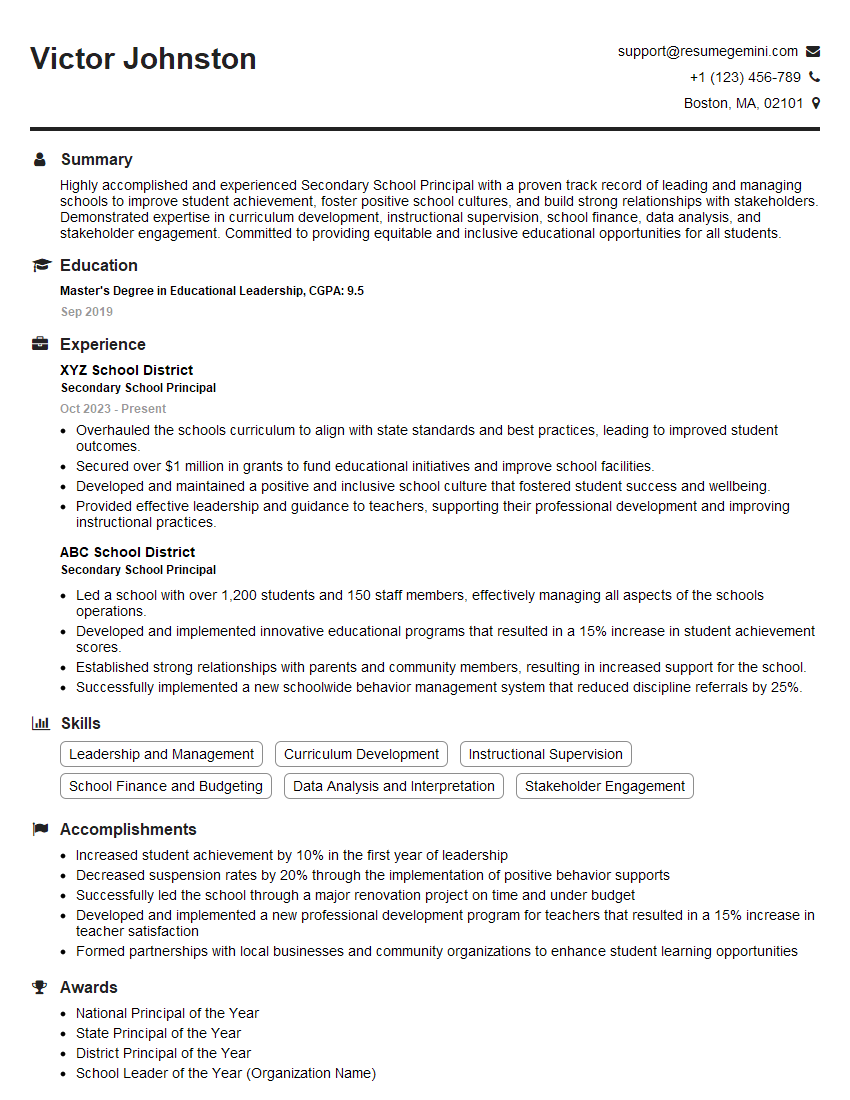Feeling lost in a sea of interview questions? Landed that dream interview for Secondary School Principal but worried you might not have the answers? You’re not alone! This blog is your guide for interview success. We’ll break down the most common Secondary School Principal interview questions, providing insightful answers and tips to leave a lasting impression. Plus, we’ll delve into the key responsibilities of this exciting role, so you can walk into your interview feeling confident and prepared.
Acing the interview is crucial, but landing one requires a compelling resume that gets you noticed. Crafting a professional document that highlights your skills and experience is the first step toward interview success. ResumeGemini can help you build a standout resume that gets you called in for that dream job.
Essential Interview Questions For Secondary School Principal
1. Describe the key components of an effective school culture, and how you have fostered such a culture in your previous role?
Answer: * Collaboration: Creating opportunities for teachers, students, and parents to work together towards shared goals. * Inclusivity: Establishing a welcoming and supportive environment for students and staff from diverse backgrounds. * Academic excellence: Setting high standards and providing resources to support student achievement. * Student leadership: Empowering students to take ownership of their education and contribute to the school community. * Positive discipline: Implementing a system that focuses on building relationships and teaching appropriate behaviors.
2. How do you engage parents and the wider community in the educational process?
Communication and outreach
- Establishing clear and regular communication channels (e.g., newsletters, emails, social media, parent-teacher conferences).
- Organizing community events and programs to foster a sense of belonging and support.
Partnerships and collaborations
- Developing partnerships with local businesses, organizations, and higher education institutions to provide opportunities for students.
- Collaborating with community groups to address issues that impact student well-being and academic success.
3. How have you used data to inform your decision-making as a school leader?
- Collecting and analyzing data from various sources (e.g., assessments, surveys, attendance records).
- Identifying trends and patterns in student performance to inform instructional strategies and support systems.
- Using data to monitor progress towards school goals and make informed adjustments to improve outcomes.
4. What is your approach to professional development for teachers?
- Creating a culture of continuous learning and professional growth.
- Offering a variety of professional development opportunities (e.g., workshops, conferences, online courses).
- Supporting teachers in setting professional goals and identifying areas for improvement.
- Providing mentorship and coaching to support teacher development.
5. How do you handle conflicts and resolve issues within the school community?
- Establishing a clear and fair process for addressing conflicts.
- Facilitating open communication and active listening to understand different perspectives.
- Seeking input and support from stakeholders (e.g., teachers, students, parents).
- Working collaboratively to find mutually acceptable solutions.
6. What are your strategies for promoting student well-being and mental health?
- Creating a supportive and inclusive environment.
- Implementing programs and initiatives that focus on mental health and emotional well-being.
- Partnering with mental health professionals to provide support and services to students.
- Training staff on recognizing and responding to signs of mental health concerns.
7. How do you stay abreast of current educational trends and best practices?
- Attending conferences and workshops.
- Reading professional journals and books.
- Participating in online communities and discussion forums.
- Seeking opportunities to collaborate and learn from other educators.
8. What are your strengths as a school leader, and how have they contributed to your success?
- Strong leadership skills and a clear vision for the school.
- Excellent communication and interpersonal skills.
- Ability to motivate and inspire staff and students.
- A commitment to student success and equity.
9. What are your areas for growth as a school leader, and how do you plan to address them?
- Identifying areas for improvement through self-reflection and feedback from others.
- Setting professional development goals and seeking opportunities to enhance skills and knowledge.
- Mentoring or working with colleagues to learn new strategies and perspectives.
10. How do you balance the demands of being a school leader with maintaining a healthy work-life balance?
- Setting boundaries and prioritizing tasks.
- Delegating responsibilities and empowering others.
- Seeking support from colleagues, family, and friends.
- Engaging in activities that promote personal well-being and stress reduction.
Interviewers often ask about specific skills and experiences. With ResumeGemini‘s customizable templates, you can tailor your resume to showcase the skills most relevant to the position, making a powerful first impression. Also check out Resume Template specially tailored for Secondary School Principal.
Career Expert Tips:
- Ace those interviews! Prepare effectively by reviewing the Top 50 Most Common Interview Questions on ResumeGemini.
- Navigate your job search with confidence! Explore a wide range of Career Tips on ResumeGemini. Learn about common challenges and recommendations to overcome them.
- Craft the perfect resume! Master the Art of Resume Writing with ResumeGemini’s guide. Showcase your unique qualifications and achievements effectively.
- Great Savings With New Year Deals and Discounts! In 2025, boost your job search and build your dream resume with ResumeGemini’s ATS optimized templates.
Researching the company and tailoring your answers is essential. Once you have a clear understanding of the Secondary School Principal‘s requirements, you can use ResumeGemini to adjust your resume to perfectly match the job description.
Next Step:
Now that you’re armed with the knowledge of Secondary School Principal interview questions and responsibilities, it’s time to take the next step. Build or refine your resume to highlight your skills and experiences that align with this role. Don’t be afraid to tailor your resume to each specific job application. Finally, start applying for Secondary School Principal positions with confidence. Remember, preparation is key, and with the right approach, you’ll be well on your way to landing your dream job. Build an amazing resume with ResumeGemini
